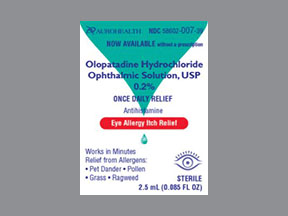
Eq Olopatadine Hcl Coupons & Savings Card – Discount Prices from $12.17
Brand for: Olopatadine
This medication is an antihistamine designed to alleviate itching and redness in the eyes caused by allergies. It is important to note that this medication should not be used for eye irritation resulting from contact lens wear.
Our Eq Olopatadine Hcl coupons are free to use. You can print the coupon, email it to yourself, or receive the Eq Olopatadine Hcl coupon via text message. To get your free discount, show the pharmacist your Eq Olopatadine Hcl savings card which has the discounted coupon price. Use our filters below to edit the prescription box to match your needs. The Eq Olopatadine Hcl prices will update based on your prescription needs. Above our Eq Olopatadine Hcl coupons, you can change the location to see pharmacy prices in other areas. Our prescription discount card will update online with the specific pharmacy costs associated with your edits. Be sure to text, email, or print the Eq Olopatadine Hcl savings card code that you need after editing the prescription box and location field. Show the discount card to your pharmacist before paying.
My prescription
Edit
2.5ML of 0.2%, Olopatadine (1 Bottle)
Select pharmacy

Albertsons
$12.17
COUPON PRICE
Walgreens
$13.89
COUPON PRICEEq Olopatadine Hcl savings card
Show this card to your pharmacist
Albertsons
$12.17
BIN
ID
PCN
GRP
011867
LH49CFD1D0
HT
LABH001
Powered by
This medication is an antihistamine designed to alleviate itching and redness in the eyes caused by allergies. It is important to note that this medication should not be used for eye irritation resulting from contact lens wear.
Our Eq Olopatadine Hcl coupons are free to use. You can print the coupon, email it to yourself, or receive the Eq Olopatadine Hcl coupon via text message. To get your free discount, show the pharmacist your Eq Olopatadine Hcl savings card which has the discounted coupon price. Use our filters below to edit the prescription box to match your needs. The Eq Olopatadine Hcl prices will update based on your prescription needs. Above our Eq Olopatadine Hcl coupons, you can change the location to see pharmacy prices in other areas. Our prescription discount card will update online with the specific pharmacy costs associated with your edits. Be sure to text, email, or print the Eq Olopatadine Hcl savings card code that you need after editing the prescription box and location field. Show the discount card to your pharmacist before paying.
More prescriptions for allergic rhinitis
coupons from$21.67Save 35%
coupons from$3.78Save 75%
coupons from$19.83Save 80%
coupons from$20.61Save 70%
coupons from$8.17Save 79%
coupons from$34.16Save 69%
coupons from$193.94Save 87%
coupons from$54.96Save 79%
More prescriptions for allergic rhinitis
Cortef Save 35%coupons from $21.67
Prednisolone Sodium Phosphate Save 75%coupons from $3.78
Dexamethasone Intensol Save 80%coupons from $19.83
Nasacort Allergy 24hr Save 70%coupons from $20.61
Cyproheptadine Save 79%coupons from $8.17
Nohist-lq Save 69%coupons from $34.16
Budesonide ER Save 87%coupons from $193.94
Orapred Odt Save 79%coupons from $54.96
Eq Olopatadine Hcl (Olopatadine) dosage forms
Use our Eq Olopatadine Hcl (Olopatadine) 2.5ML of 0.2% coupon with prices from $17.85 for 1 Bottle. You can also use our Eq Olopatadine Hcl (Olopatadine) 2.5ML of 0.2% coupon with prices from $26.70 for 2 Bottles. We have a Eq Olopatadine Hcl (Olopatadine) 2.5ML of 0.2% coupon with prices from $35.55 for 3 Bottles. You can use our Eq Olopatadine Hcl (Olopatadine) 5ML of 0.1% coupon with prices from $19.00 for 1 Bottle.
Dosage Quantity Price from Per unit 2.5ML of 0.2% 1 Bottle $17.85 $17.85 2.5ML of 0.2% 2 Bottles $26.70 $13.35 2.5ML of 0.2% 3 Bottles $35.55 $11.85 5ML of 0.1% 1 Bottle $19.00 $19.00 5ML of 0.1% 2 Bottles $27.15 $13.57 5ML of 0.1% 3 Bottles $33.22 $11.07
| Dosage | Quantity | Price from | Per unit |
|---|---|---|---|
| 2.5ML of 0.2% | 1 Bottle | $17.85 | $17.85 |
| 2.5ML of 0.2% | 2 Bottles | $26.70 | $13.35 |
| 2.5ML of 0.2% | 3 Bottles | $35.55 | $11.85 |
| 5ML of 0.1% | 1 Bottle | $19.00 | $19.00 |
| 5ML of 0.1% | 2 Bottles | $27.15 | $13.57 |
| 5ML of 0.1% | 3 Bottles | $33.22 | $11.07 |
Eq Olopatadine Hcl FAQs
What is olopatadine HCl used for?
Olopatadine HCl is used to treat symptoms of allergic conjunctivitis, such as itching, redness, and swelling of the eyes.
Is olopatadine HCl the same as Pataday?
Yes, olopatadine HCl is the active ingredient in Pataday. Pataday is a brand name for eye drops that contain olopatadine hydrochloride, which is used to treat symptoms of allergic conjunctivitis.
Is olopatadine a steroid?
Olopatadine is not a steroid. It is an antihistamine used to treat symptoms of allergic conjunctivitis.
